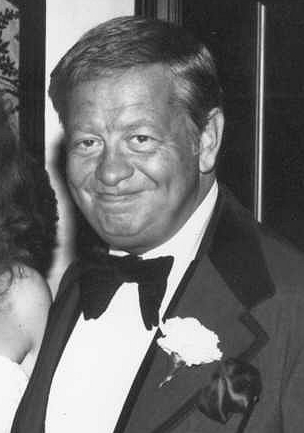
Mel Tormé
Melvin Howard Tormé (September 13, 1925 – June 5, 1999),[1] nicknamed "The Velvet Fog", was an American musician, singer, composer, arranger, drummer, actor, and author. He composed the music for "The Christmas Song" ("Chestnuts Roasting on an Open Fire") and co-wrote the lyrics with Bob Wells. Tormé won two Grammy Awards and was nominated a total of 14 times.[2]
Mel Tormé
Melvin Howard Tormé
The Velvet Fog
June 5, 1999 (aged 73)
Los Angeles, California, U.S.
- Singer
- musician
- composer
- arranger
- actor
- author
- Vocals
- drums
1929–1996
Candy Toxton (1949–55)
Arlene Miles (1956–65)
Janette Scott (1966–77)
Ali Severson
(June 5, 1984–99)
Early life[edit]
Melvin Howard Tormé was born in Chicago, Illinois, to William David Tormé, a Jewish immigrant from Poland, and Betty Tormé (née Sopkin), a New York City native.[3][4][5] He graduated from Hyde Park High School.[6] A child prodigy, he first performed professionally at age four with the Coon-Sanders Orchestra, singing "You're Driving Me Crazy" at Chicago's Blackhawk restaurant.[7]
He played drums in the drum-and-bugle corps at Shakespeare Elementary School. From 1933 to 1941, he acted in the radio programs The Romance of Helen Trent and Jack Armstrong, the All-American Boy. He wrote his first song at 13. Three years later his first published song, "Lament to Love", became a hit for bandleader Harry James.
Career[edit]
Jazz music[edit]
From 1942 to 1943, he was a member of a band led by Chico Marx of the Marx Brothers. He was the singer and drummer and also created some arrangements.[8] In 1943, Tormé made his movie debut in Frank Sinatra's first film, the musical Higher and Higher.[8] His appearance in the 1947 film musical Good News made him a teen idol.
In 1944, he formed the vocal quintet Mel Tormé and His Mel-Tones, modeled on Frank Sinatra and The Pied Pipers. The Mel-Tones, which included Les Baxter and Ginny O'Connor, had several hits fronting Artie Shaw's band and on their own, including Cole Porter's "What Is This Thing Called Love?" The Mel-Tones were among the first jazz-influenced vocal groups,[9] blazing a path later followed by The Hi-Lo's, The Four Freshmen, and The Manhattan Transfer.
Tormé was discharged from the United States Army in 1946, and soon returned to a life of radio, television, movies, and music.[8] In 1947, he started a solo singing career. His appearances at New York's Copacabana led local disc jockey Fred Robbins to give him the nickname "The Velvet Fog" in honor of his high tenor and smooth vocal style. Tormé detested the nickname. He self-deprecatingly referred to it as "this Velvet Frog voice".[10] As a solo singer, he recorded several romantic hits for Decca and with the Artie Shaw Orchestra for Musicraft (1946–1948). In 1949, he moved to Capitol, where his first record, "Careless Hands", became his only number-one hit. His versions of "Again" and "Blue Moon" became signature songs. His composition California Suite, prompted by Gordon Jenkins's "Manhattan Tower", became Capitol's first 12-inch LP album. Around this time, he helped pioneer cool jazz.
He had a radio program, Mel Tormé Time, which appeared on the short-lived Progressive Broadcasting System in the 1950s.[11]
From 1955 to 1957, he recorded seven vocal jazz albums for Red Clyde's Bethlehem Records, all with groups led by Marty Paich, most notably Mel Tormé and the Marty Paich Dek-Tette. He became known for his arranging skills, earning the respect of musicians.[8]
In his 1994 book My Singing Teachers, Tormé cited Patty Andrews, lead singer of the Andrews Sisters, one of the most successful show business acts of the 1940s, as one of his favorite vocalists, saying,
Children and stepchildren: